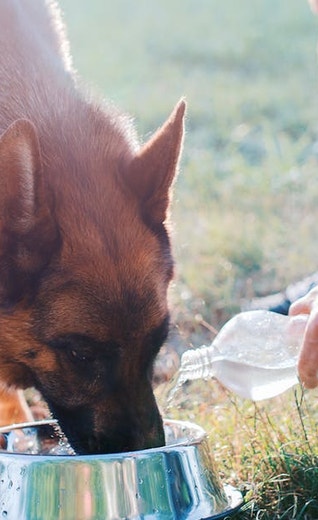GET THE FACTS ON EXERCISE-INDUCED HEAT-RELATED ILLNESS
DOGS DON’T KNOW HEAT CAN HURT
Your dog’s drive can override his ability to recognize he’s heating up. Push it too far, and he’s at risk of developing a dangerously high core body temperature. As his owner, it’s your responsibility to know when your dog might overheat and take preventative action.

EXERCISE-INDUCED HEAT-RELATED ILLNESS (HRI):
When a dog’s activity causes his body to generate more heat than he can dissipate.
KEYS TO KEEPING COOL
HYDRATE
CONDITION
ACCLIMATE
KNOW THE SIGNS OF EXERCISE-INDUCED HRI
SIGNS
● Increased thirst
● Excessive panting
● Widened or flat tongue
● Cheeks pulled back, revealing molars
● Pasty saliva
● Slower, unfocused or apprehensive
WHAT TO DO
● Take a break
● Apply water to paws and belly
● Rinse mouth
● Check his temperature
● Rub alcohol on ears, armpits and groin
● Consult vet
SIGNS
● Weakness or stumbling
● Sunken, dry eyes
● Dry mouth, gums or nose
● Vomit or diarrhea
● Muscle tremors
● Uncontrollable panting
WHAT TO DO
Everything from stage one plus:
● Lie dog on side with wet towel
● Turn on a fan
● Get to the vet ASAP
WARNING
Do not put your dog in cold water or hold ice to his skin

“Be aware of the situations you're putting your dogs in.
If it's potentially dangerous, don't do it.”
Dr. Joe Spoo, DVM




